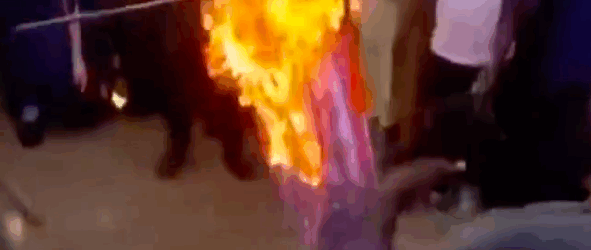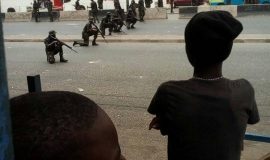Biafra
Flag of Liberty in Flames: U.S. Flag Burned by Northern Nigerian Protesters Amid Rising Christian-Rights Debate
A dramatic incident has emerged in Nigeria’s ongoing security and religious-rights discourse. A newly circulated video reportedly showing the burning of the United States flag by demonstrators in northern Nigeria comes at a time of heightened international scrutiny over attacks on Christian communities in the country.
What Happened
According to the footage and accompanying social-media posts, a large group of protesters in a northern region of Nigeria set a U.S. national flag alight. The act is reportedly a response to remarks defending Christians under attack in Nigeria, and to rising criticism from U.S. officials of the Nigerian government’s handling of violence against Christians.
While the specific location and time of the flag-burning remain unverified in publicly available sources, the incident connects to a broader backdrop of conflict and diplomatic tension.
The Context: Religious Violence & International Pressure
Nigeria has witnessed repeated attacks on Christian-majority farming communities in the middle belt and northern zones, involving herders, bandits, and extremist groups. For example, more than 50 Christians were killed in April 2025 in a single village in Plateau State. Global Christian Relief+2christiannews.net+2
Advocacy groups allege that thousands of Christians have been killed in recent years, including claims of over 8,000 Christian deaths from January 2023 to January 2024. intersociety-ng.org
In the diplomatic arena, U.S. former President Donald Trump threatened military action against Nigeria and warned of cutting aid if the killings of Christians continue. The Guardian+2The Washington Post+2
At the same time, the Nigerian government has rejected the narrative that the violence is predominately religiously-motivated or that the state is allowing a genocide of Christians to take place. Vanguard News
Analysts caution that the violence is complex, involving land disputes, herder-farmer conflicts, resource pressure and insecurity, rather than being solely about religion. Al Jazeera+1
Interpreting the Flag-Burning Incident
The act of burning the U.S. flag can be seen as a symbolic protest:
- As a reaction to international pressure: With U.S. criticisms of Nigeria’s handling of Christian-community attacks, the protesters may be signalling resistance to external intervention or condemnation.
- As a domestic message: Protesters may be expressing anger over perceived bias in international discourse—suggesting that Nigeria’s challenges are being simplified as a Christian-vs-Muslim conflict.
- As a broader diplomatic statement: The imagery of an American flag burning draws attention and underscores that the grievances are significant to the local population.
Key Questions & Caveats
- Location and timing: The exact state or local government area where the flag-burning occurred is not yet independently verified.
- Who are the protestors? It’s unclear whether the demonstrators represent an organised group (religious, ethnic, or otherwise) or are spontaneous.
- Motivation: While linked in posts to remarks defending Christians, it is not confirmed that the protest directly relates to a specific incident or condemnation.
- Risk of mis-/disinformation: In Nigeria’s context of viral violence videos, fact-checking organisations emphasise caution: for instance a video circulated as showing Islamist militants killing Christians was found to be unrelated to the claimed date and location. Africa Check
Implications
- For Nigeria-U.S. relations: The incident may strain diplomatic ties. U.S. concerns over religious violence in Nigeria have already sparked threats of sanctions or military planning.
- For internal Nigerian politics: The flag-burning could inflame already fraught debates about religious freedom, minority rights, and state capacity to protect citizens.
- For media discourse: The symbolic act will be used by different sides—some may see it as defiance against western pressure; others as proof of growing anti-western sentiment linked to internal religious/ethnic tensions.
- For on-the-ground communities: Farmers, Christians, herders and mixed-faith communities are caught in cycles of violence that go beyond religion alone. The protest hints at deeper anger and frustration.
What to Watch For
- Independent verification of the video: location, date, organiser(s).
- Official Nigerian government or state-authority response to the flag-burning incident.
- Further protests or symbolic acts in other states.
- U.S. government reaction—whether the incident influences policy or rhetoric toward Nigeria.
- Local communities’ own responses—whether Christian, Muslim or mixed-faith groups condemn or engage with the protest.
Final Note
While the video of a U.S. flag being burned in northern Nigeria is striking and symbolically potent, it should be seen within the larger, complex landscape of Nigerian security, ethnic, religious and resource-driven conflict. The facts around the protest are still emerging, and care should be taken to avoid oversimplifying the motivations or consequences.
Biafra Radio
November 9th, 2025
No comments



